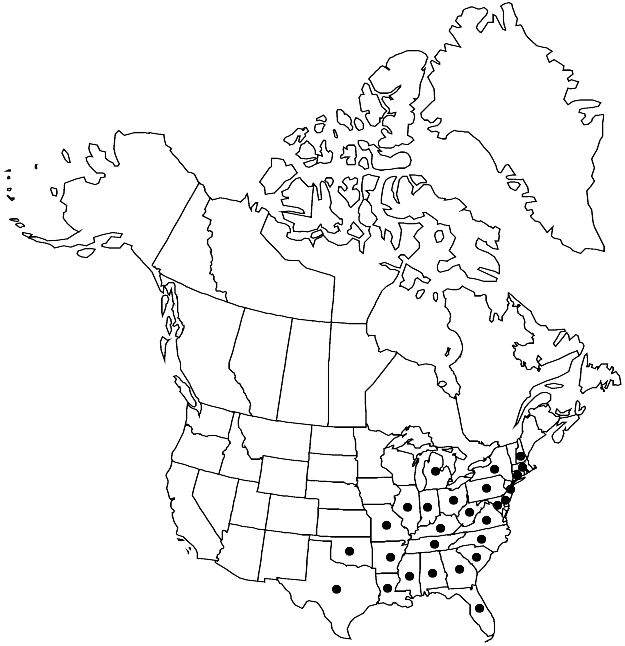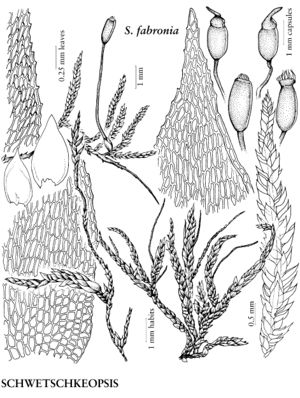Difference between revisions of "Schwetschkeopsis fabronia"
in H. G. A. Engler and K. Prantl, Nat. Pflanzenfam. 227/228[I,3]: 878. 1907.
FNA>Volume Importer |
imported>Volume Importer |
||
| (6 intermediate revisions by 2 users not shown) | |||
| Line 1: | Line 1: | ||
{{Treatment/ID | {{Treatment/ID | ||
|accepted_name=Schwetschkeopsis fabronia | |accepted_name=Schwetschkeopsis fabronia | ||
| − | |accepted_authority=(Schwagrichen) Brotherus | + | |accepted_authority=(Schwagrichen) Brotherus |
|publications={{Treatment/Publication | |publications={{Treatment/Publication | ||
|title=in H. G. A. Engler and K. Prantl, Nat. Pflanzenfam. | |title=in H. G. A. Engler and K. Prantl, Nat. Pflanzenfam. | ||
| Line 9: | Line 9: | ||
|special_status={{Treatment/ID/Special_status | |special_status={{Treatment/ID/Special_status | ||
|code=F | |code=F | ||
| − | |label= | + | |label=Illustrated |
}} | }} | ||
| − | |basionyms={{Treatment/ID/ | + | |basionyms={{Treatment/ID/Basionym |
|name=Helicodontium fabronia | |name=Helicodontium fabronia | ||
|authority=Schwägrichen | |authority=Schwägrichen | ||
| + | |rank=species | ||
| + | |publication_title=Sp. Musc. Frond. Suppl. | ||
| + | |publication_place=3(2,2): plate 294. 1830 | ||
}} | }} | ||
|synonyms={{Treatment/ID/Synonym | |synonyms={{Treatment/ID/Synonym | ||
|name=Leskea denticulata | |name=Leskea denticulata | ||
|authority=Sullivant | |authority=Sullivant | ||
| − | }}{{Treatment/ID/Synonym | + | |rank=species |
| + | }} {{Treatment/ID/Synonym | ||
|name=Schwetschkea denticulata | |name=Schwetschkea denticulata | ||
|authority=(Sullivant) Cardot | |authority=(Sullivant) Cardot | ||
| − | }}{{Treatment/ID/Synonym | + | |rank=species |
| + | }} {{Treatment/ID/Synonym | ||
|name=Schwetschkeopsis denticulata | |name=Schwetschkeopsis denticulata | ||
|authority=(Sullivant) Brotherus | |authority=(Sullivant) Brotherus | ||
| + | |rank=species | ||
}} | }} | ||
|hierarchy=Myriniaceae;Schwetschkeopsis;Schwetschkeopsis fabronia | |hierarchy=Myriniaceae;Schwetschkeopsis;Schwetschkeopsis fabronia | ||
| Line 39: | Line 45: | ||
|elevation=low to moderate elevations (100-1200 m) | |elevation=low to moderate elevations (100-1200 m) | ||
|distribution=Ala.;Ark.;Conn.;Del.;Fla.;Ga.;Ill.;Ind.;Ky.;La.;Md.;Mass.;Mich.;Miss.;Mo.;N.H.;N.J.;N.Y.;N.C.;Ohio;Okla.;Pa.;S.C.;Tenn.;Tex.;Va.;W.Va.;West Indies (Cuba);e Asia. | |distribution=Ala.;Ark.;Conn.;Del.;Fla.;Ga.;Ill.;Ind.;Ky.;La.;Md.;Mass.;Mich.;Miss.;Mo.;N.H.;N.J.;N.Y.;N.C.;Ohio;Okla.;Pa.;S.C.;Tenn.;Tex.;Va.;W.Va.;West Indies (Cuba);e Asia. | ||
| − | |discussion=<p>Schwetschkeopsis fabronia is a very slender, delicate moss typically with an evenly combed appearance due to the branches generally being directed downward in an orderly fashion. Clasmatodon parvulus is somewhat similar to and often occurs with S. fabronia. In the field, Clasmatodon can generally be distinguished from Schwetschkeopsis by its dull color and less even branch arrangement. The stems and branches of Clasmatodon are similar in size, while in Schwetschkeopsis the stems are generally noticeably larger than the branches. Microscopically the two are easily separated by the well-developed single costa of Clasmatodon versus the faint, short and double or frequently absent costa of Schwetschkeopsis. Many colonies of Schwetschkeopsis have stems composed almost entirely or in part of long, flagellate branches. Both H. A. Crum and L. E. Anderson (1981) and W. D. Reese (1984) reported that Schwetschkeopsis is ecostate, but many leaves exhibit a very faint, short, double costa. Only four collections, two each from Florida and Tennessee, were observed with mature sporophytes (two in October, two in February).</p> | + | |discussion=<p><i>Schwetschkeopsis fabronia</i> is a very slender, delicate moss typically with an evenly combed appearance due to the branches generally being directed downward in an orderly fashion. <i>Clasmatodon parvulus</i> is somewhat similar to and often occurs with <i>S. fabronia</i>. In the field, <i>Clasmatodon</i> can generally be distinguished from <i>Schwetschkeopsis</i> by its dull color and less even branch arrangement. The stems and branches of <i>Clasmatodon</i> are similar in size, while in <i>Schwetschkeopsis</i> the stems are generally noticeably larger than the branches. Microscopically the two are easily separated by the well-developed single costa of <i>Clasmatodon</i> versus the faint, short and double or frequently absent costa of <i>Schwetschkeopsis</i>. Many colonies of <i>Schwetschkeopsis</i> have stems composed almost entirely or in part of long, flagellate branches. Both H. A. Crum and L. E. Anderson (1981) and W. D. Reese (1984) reported that <i>Schwetschkeopsis</i> is ecostate, but many leaves exhibit a very faint, short, double costa. Only four collections, two each from Florida and Tennessee, were observed with mature sporophytes (two in October, two in February).</p> |
|tables= | |tables= | ||
|references= | |references= | ||
| Line 48: | Line 54: | ||
-->{{#Taxon: | -->{{#Taxon: | ||
name=Schwetschkeopsis fabronia | name=Schwetschkeopsis fabronia | ||
| − | + | |authority=(Schwagrichen) Brotherus | |
| − | |authority=(Schwagrichen) Brotherus | ||
|rank=species | |rank=species | ||
|parent rank=genus | |parent rank=genus | ||
| Line 62: | Line 67: | ||
|publication title=in H. G. A. Engler and K. Prantl, Nat. Pflanzenfam. | |publication title=in H. G. A. Engler and K. Prantl, Nat. Pflanzenfam. | ||
|publication year=1907 | |publication year=1907 | ||
| − | |special status= | + | |special status=Illustrated |
| − | |source xml=https:// | + | |source xml=https://bitbucket.org/aafc-mbb/fna-data-curation/src/2e0870ddd59836b60bcf96646a41e87ea5a5943a/coarse_grained_fna_xml/V28/V28_743.xml |
|genus=Schwetschkeopsis | |genus=Schwetschkeopsis | ||
|species=Schwetschkeopsis fabronia | |species=Schwetschkeopsis fabronia | ||
Latest revision as of 22:37, 5 November 2020
Plants dark olive green. Stems usually conspicuously wider than branches, branches prostrate or ascending, simple or rarely with small secondary branches, often flagelliform, usually all pointing same direction. Leaves ovate-lanceolate, 0.5–0.7 × 0.3–0.4 mm; apex acute to acuminate; proximal laminal cells 8–17 × 10–13 µm; medial and distal cells 30–50 × 7–10 µm, mammillose abaxially due to projecting distal ends. Seta 0.4–0.8 cm. Capsule 1–1.4 mm; exostome teeth triangular-lanceolate, 240–350 × 40–50 µm. Spores 11–16 µm.
Phenology: Capsules mature Oct, Feb.
Habitat: Base of hardwoods, acidic and basic rock
Elevation: low to moderate elevations (100-1200 m)
Distribution

Ala., Ark., Conn., Del., Fla., Ga., Ill., Ind., Ky., La., Md., Mass., Mich., Miss., Mo., N.H., N.J., N.Y., N.C., Ohio, Okla., Pa., S.C., Tenn., Tex., Va., W.Va., West Indies (Cuba), e Asia.
Discussion
Schwetschkeopsis fabronia is a very slender, delicate moss typically with an evenly combed appearance due to the branches generally being directed downward in an orderly fashion. Clasmatodon parvulus is somewhat similar to and often occurs with S. fabronia. In the field, Clasmatodon can generally be distinguished from Schwetschkeopsis by its dull color and less even branch arrangement. The stems and branches of Clasmatodon are similar in size, while in Schwetschkeopsis the stems are generally noticeably larger than the branches. Microscopically the two are easily separated by the well-developed single costa of Clasmatodon versus the faint, short and double or frequently absent costa of Schwetschkeopsis. Many colonies of Schwetschkeopsis have stems composed almost entirely or in part of long, flagellate branches. Both H. A. Crum and L. E. Anderson (1981) and W. D. Reese (1984) reported that Schwetschkeopsis is ecostate, but many leaves exhibit a very faint, short, double costa. Only four collections, two each from Florida and Tennessee, were observed with mature sporophytes (two in October, two in February).
Selected References
None.
